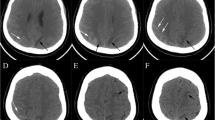Abstract
The posterior reversible encephalopathy syndrome (PRES) is characterized by several neurological signs and symptoms from different pathological causes. The interpretation of magnetic resonance imaging (MRI) is crucial in atypical presentations, to avoid a misdiagnosis and delays in treatment, as in the identification of complicating factors. Differentiating reversible vasogenic edema from cytotoxic edema is possible with diffusion-weighted images (DWI) and apparent diffusion coefficient (ADC) mapping. We present a case of puerperal extensive PRES related to late-onset eclampsia, in a 36-year-old first-time pregnant woman with no previous history of hypertension or other risk factors, associated with a severe clinical picture but with a full recovery in few weeks. We conclude that the prognosis of puerperal PRES should be good, if underlying etiology can be treated satisfactorily, in extensive MRI involvement too.

Similar content being viewed by others
Data Availability
De-identified data and material inherent to the case report and not included in the manuscript are available on request to the corresponding author by any qualified investigator.
References
Hinchey J, Chaves C, Appignani B, Breen J, Pao L, Wang A, et al. A reversible posterior leukoencephalopathy syndrome. N Engl J Med. 1996;334:494–500.
Fisher M, Schmutzhard E. Posterior encephalopathy reversible syndrome. J Neurol. 2017;264:1608–16.
Marcoccia E, Piccioni MG, Schiavi MC, Colagiovanni V, Zannini I, Musella A, et al. Postpartum posterior reversible encephalopathy syndrome (PRES): three case reports and literature review. Case Rep Obstet Gynecol. 2019; Article ID 9527632, 11 pages.
Sardesai S, Dabade R, Deshmukh S, Patil P, Pawar S, Patil A. Posterior reversible encephalopathy syndrome (PRES): evolving the mystery of eclampsia! J Obstet Gynecol India. 2019;69(4):334–8.
Lifson N, Pasquale A, Salloum G, Alpert S. Ophthalmic manifestations of posterior reversible encephalopathy syndrome. Neuro-Ophthalmoloy. 2019;43(3):180–4.
Stevens CJ, Heran MKS. The many faces of posterior reversible encephalopathy syndrome. Br J Radiol. 2012;85:1566–75.
Cerrone P, Sucapane P, Totaro R, Sacco S, Carolei A, Marini C. Posterior reversible encephalopathy syndrome presenting with atypical findings: report of two cases. Case Rep Neurol Med. 2018; Article ID 7835415, 5 pages.
Saad AF, Chaudhari R, Wintermark M. Imaging of atypical and complicated posterior reversible encephalopathy syndrome. Front Neurol. 2019;10:964.
Samara A, Berry B, Ghannam M. Posterior reversible encephalopathy syndrome with isolated infratentorial involvement: a case report. Radiol Case Rep. 2019;14:576–80.
Masai K, Ueda Y, Naito H, Tsukahara K, Aokage T, Fujisaki N, et al. Atypical case of posterior reversible encephalopathy syndrome related to late onset postpartum eclampsia. A case report. Medicine. 2019;98:16.
Chen Z, Zhang G, Lerner A, Wang AH, Gao B, Liu J. Risk factors for poor outcome in posterior reversible encephalopathy syndrome: systematic review and meta-analysis. Quant Imaging Med Surg. 2018;8(4):421–32.
Zou LP, Liu LY, Li H, Wang YY, Liu Y, Chen J, et al. Establishment and utility assessment of posterior reversible encephalopathy syndrome early warning scoring (PEWS) scale establishment and utility assessment of PEWS scale. BMC Neurol. 2019;19:30.
Author information
Authors and Affiliations
Contributions
L.S.: acquisition of data, analysis and interpretation of data, figure creation, drafted the manuscript for intellectual content. F.S.: analysis and interpretation of data, revised the manuscript for intellectual content; G.M.E.L.T.: acquisition of imaging data.
Corresponding author
Ethics declarations
Conflict of Interest
The authors declare that they have no conflicts of interest.
Ethical Approval
This article does not contain any studies involving human participants performed by any of the authors.
Patient Perspective
The patient shared the perspective on the treatment she received.
Informed Consent
Written informed consent was collected from the patient for the inclusion of de-identified clinical data in a scientific publication, in accordance with the Declaration of Helsinki.
Additional information
Publisher’s Note
Springer Nature remains neutral with regard to jurisdictional claims in published maps and institutional affiliations.
This article is part of the Topical Collection on Medicine
Rights and permissions
About this article
Cite this article
Sinisi, L., Sinisi, F. & La Tessa, G.M.E. Extensive Posterior Reversible Encephalopathy Syndrome in Late-Onset Eclampsia: a Case Report. SN Compr. Clin. Med. 2, 2460–2462 (2020). https://doi.org/10.1007/s42399-020-00544-1
Accepted:
Published:
Issue Date:
DOI: https://doi.org/10.1007/s42399-020-00544-1




